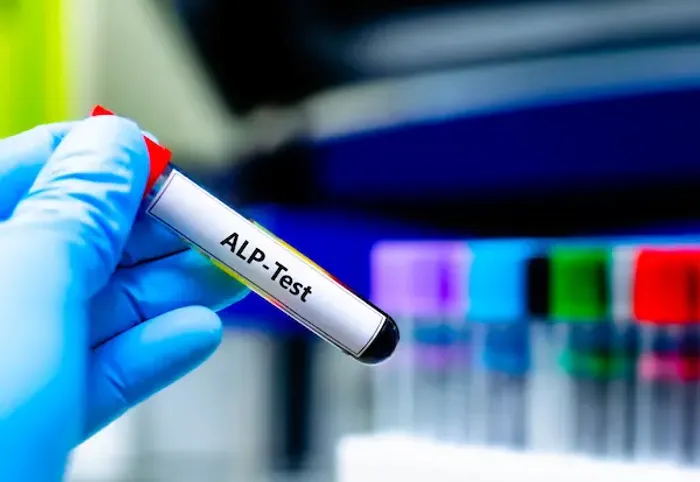Alkaline Phosphatase Levels and Testing Methods
Alkaline phosphatase (ALP) is an important enzyme linked to liver, bone, and digestive health. Learn what ALP levels mean, why testing is done, causes of high or low ALP, and how to manage abnormal results.

Written by Dr. Siri Nallapu
Reviewed by Dr. Rohinipriyanka Pondugula MBBS
Last updated on 5th Sep, 2025

Alkaline phosphatase (ALP) is an enzyme found in various parts of the body, including the liver, bones, kidneys, and digestive system. It plays a crucial role in breaking down proteins and maintaining healthy bodily functions. However, abnormal ALP levels—either too high or too low—can indicate underlying health issues.
If you’ve been advised to get an ALP test or have received results that concern you, don’t worry. This article will help you understand what alkaline phosphatase is, why it matters, and how testing works.
What Is Alkaline Phosphatase (ALP)?
Alkaline phosphatase is an enzyme that helps remove phosphate groups from molecules, which is essential for various
bodily functions. It is primarily found in:
- Liver – Helps with bile production.
- Bones – Aids in bone growth and repair.
- Kidneys and intestines – Support digestion and nutrient absorption.
Since ALP is present in multiple organs, abnormal levels can signal problems in these areas.
Why Is ALP Testing Important?
A simple blood test can measure ALP levels, helping doctors diagnose or monitor conditions such as:
- Liver diseases (hepatitis, cirrhosis, bile duct blockage)
- Bone disorders (osteoporosis, Paget’s disease, bone cancer)
- Gallbladder issues (gallstones, inflammation)
- Nutritional deficiencies (low zinc or magnesium)
Your doctor may recommend an ALP test if you experience symptoms like:
- Fatigue or weakness
- Jaundice (yellowing of skin/eyes)
- Bone pain or frequent fractures
- Nausea, vomiting, or abdominal pain
- Unexplained weight loss
How Is the ALP Test Done?
The ALP test is a simple blood test with minimal preparation:
- Fasting (if required) – Some doctors may ask you to fast for 10–12 hours before the test, especially if other liver
function tests are being done. - Blood sample collection – A healthcare professional will draw blood from a vein in your arm.
- Lab analysis – The sample is sent to a lab to measure ALP levels.
Results are usually available within a day or two.
What Do ALP Test Results Mean?
ALP levels vary by age, gender, and overall health. Normal ranges are generally:
- Adults: 20–140 IU/L (International Units per Litre)
- Children & teens: Higher due to bone growth
- Pregnant women: Slightly elevated
High ALP Levels (Hyperphosphatasemia)
Possible causes include:
- Liver or gallbladder disease (blocked bile ducts, hepatitis)
- Bone disorders (Paget’s disease, fractures, bone cancer)
- Certain medications (antibiotics, anti-seizure drugs)
- Pregnancy (due to placental ALP production)
Low ALP Levels (Hypophosphatasemia)
Less common but may indicate:
- Malnutrition or vitamin deficiencies (zinc, magnesium, vitamin B6)
- Hypothyroidism (underactive thyroid)
- Genetic disorders (like hypophosphatasia)
Your doctor will interpret results based on your medical history and other tests.
How to Manage Abnormal ALP Levels?
If your ALP levels are abnormal, your doctor may suggest further tests (like liver ultrasound, bone scans, or additional
blood work) to identify the cause. Depending on the diagnosis, treatment may include:
For High ALP:
- Liver support: Avoid alcohol, eat a balanced diet, and take prescribed medications if liver disease is detected.
- Bone health: Increase calcium and vitamin D intake if bone-related issues are present.
- Medication adjustments: If certain drugs are raising ALP, your doctor may change prescriptions.
For Low ALP:
- Nutritional supplements: Zinc, magnesium, or vitamin B6 if deficiencies are found.
- Thyroid treatment: If hypothyroidism is the cause, thyroid hormone therapy may help.
General Lifestyle Tips:
- Eat a balanced diet – Include fruits, vegetables, lean proteins, and whole grains.
- Stay hydrated – Supports liver and kidney function.
- Exercise regularly – Strengthens bones and improves overall health.
- Avoid excessive alcohol – Protects liver function.
When to See a Doctor?
If your ALP test shows abnormal levels, consult your doctor for a proper diagnosis. Seek immediate medical attention if
you experience:
- Severe abdominal pain
- Persistent jaundice
- Unexplained bone pain or fractures
Early detection and treatment can prevent complications.
Book an ALP Test with Apollo 24|7
If you need an alkaline phosphatase test or further consultation, Apollo 24|7 offers:
- 🔹 Easy online booking for lab tests
- 🔹 Home sample collection for convenience
- 🔹 Expert doctor consultations for personalised advice
Final Thoughts
Alkaline phosphatase is a vital enzyme, and its levels can reveal important health insights. While abnormal results may seem concerning, they often guide doctors in diagnosing and treating underlying conditions effectively. By staying informed and following medical advice, you can maintain good liver, bone, and overall health.
If you have any concerns about your ALP levels, don’t hesitate to reach out to a healthcare professional.
Consult a General Practitioner for Personalised Advice
Consult a General Practitioner for Personalised Advice

Dr. Syed Ismail Ali
General Practitioner
7 Years • MBBS
Hyderabad
Apollo 24|7 Clinic, Hyderabad

Dr D M Karthik
General Practitioner
4 Years • MBBS, Fellowship in Diabetes Mellitus, Advance certificate in Diabetes Mellitus, Derma Nutrition Certification
Visakhapatnam
Apollo 24|7 Clinic - Andhra Pradesh, Visakhapatnam

Dr. M L Ezhilarasan
General Practitioner
6 Years • MBBS
Visakhapatnam
Apollo 24|7 Clinic - Andhra Pradesh, Visakhapatnam
Dr. Gaddam Manoj
General Practitioner
1 Years • MBBS
Hyderabad
Aaradhya clinic, Hyderabad

Dr. Madhuri Sai Sreepada
General Practitioner
9 Years • MBBS
Hyderabad
BRIGHT SMILES MEDICARE & DENTAL CARE, Hyderabad